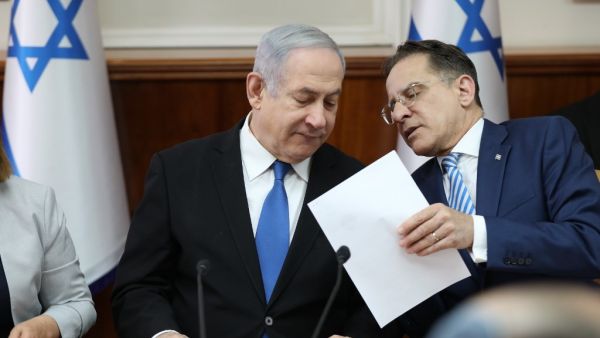Benjamin Netanyahu could be given a presidential pardon on allegations of corruption if he admits the charges and retires from politics, it has been claimed.
The move, reportedly being considered by President Reuven Rivlin, could provide a way out of the political deadlock that has gripped the country since April.
Israel is facing an unprecedented third election in just 12 months if a coalition agreement between parties cannot be reached by December 11.
A key sticking point is thought to be the future of the country's longest-serving Prime Minister, who was indicted on charges of fraud, breach of trust and bribery two weeks ago.
Benny Gantz, Netanyahu's main rival, has previously said he wouldn't work with the embattled leader while he was facing charges.
After Netanyahu was indicted, Gantz blasted that he has 'no public or moral mandate to make fateful decisions for the state of Israel.'
The two leaders have been attempting to form a government of national unity after a September ballot left both of them short of a majority of seats in the Knesset, and short of enough allies to form a working coalition.
Another vote in April produced a similarly inconclusive result.
As a way to break the impasse, Israel's Channel 12 news reports that Rivlin is open to the idea of allowing Netanyahu to peacefully retire by using his presidential pardon.
But first he will have to plead guilty to the charges, which he has previously described as a 'coup attempt'.
'It is an attempted coup based on fabrications and a tainted and biased investigative process,' Netanyahu said during a televised speech on the day he was indicted.
'I will continue to lead the country, according to the letter of the law, with responsibility, devotion and concern for all of our futures.'
Netanyahu is suspected of wrongfully accepting $264,000 (£204,000) worth of gifts, which prosecutors said included cigars and champagne, from tycoons and of dispensing favours in alleged bids for improved coverage by an Israeli newspaper and a website.
He could face up to 10 years in prison if convicted of bribery and a maximum 3-year term for fraud and breach of trust.
Israel's Central Elections Committee has said it is preparing for another round of voting, despite there still being a week left for a deal to be struck.
The committee has agreed to reduce the number of days between the Knesset being dispersed and a potential election being held to just 75 days, from the usual 90.
That means the earliest date a vote could be held would be February 24, 2020.
This article has been adapted from its original source.








